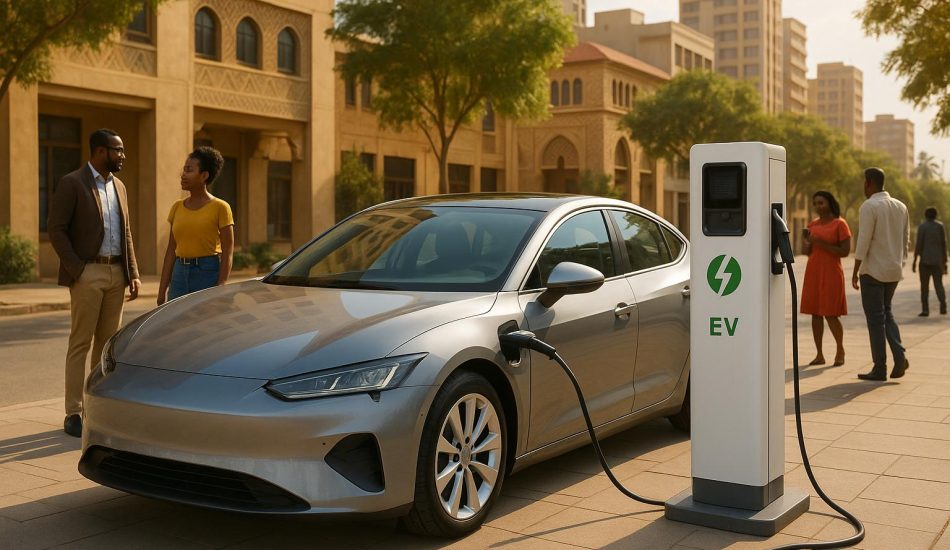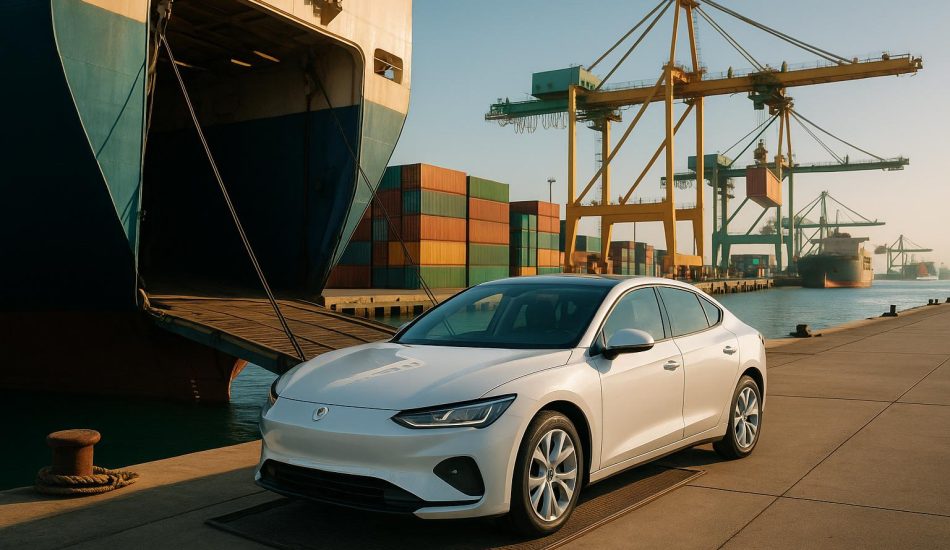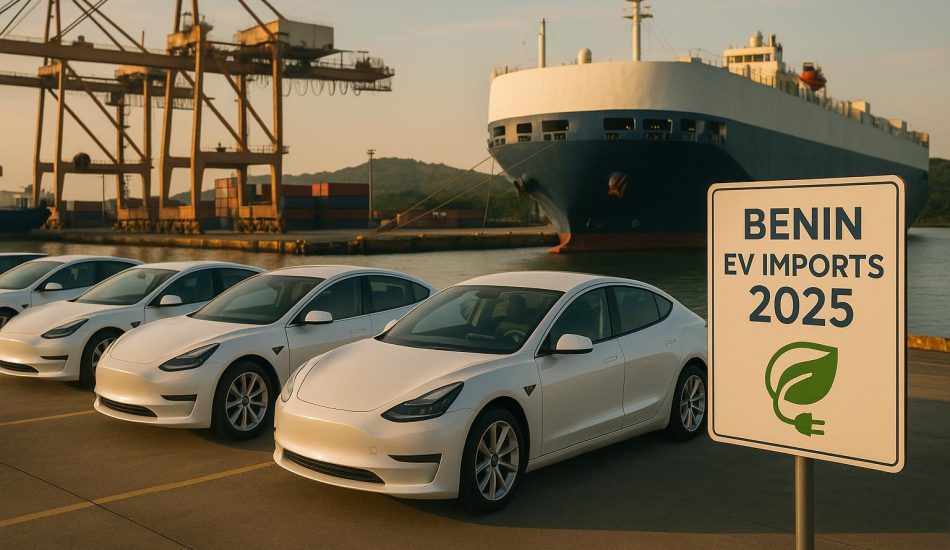
Togo has simplified the process of importing electric vehicles (EVs) by eliminating VAT and customs duties, making EVs more affordable compared to traditional fuel-powered cars. However, importing an EV requires specific government approvals and compliance with local regulations. Here’s a quick overview of the process:
- Key Benefits: EVs are 100% exempt from VAT and customs duties, and electric motorcycles receive a full customs duty refund.
- Approval Requirement: Pre-approval from the Ministry of Environment and Ministry of Trade is mandatory before customs clearance.
- Essential Documents: You’ll need items like a Bill of Lading, Commercial Invoice, Import Permit, and Certificate of Conformity.
- Customs Process: File a preliminary import declaration and ensure your EV meets Togo’s technical and labeling standards.
- Final Step: Register your EV locally to get license plates and start driving.
Togo’s policies reflect its push for greener transportation options, with streamlined procedures to encourage EV adoption. Follow these steps to ensure a smooth import experience.
Togo’s EV Import Rules and Regulations
Togo has introduced a regulatory framework for electric vehicle (EV) imports that’s designed to encourage sustainability while offering economic benefits. One of the most notable measures is the 100% exemption from both VAT and customs duties on electric vehicles. Additionally, the government provides a 100% customs duty refund specifically for new electric motorcycles. To make the process smoother, approval and compliance procedures have been streamlined to simplify EV imports into the country.
Government Approval Process
To align with its vision for a greener automotive sector, Togo mandates pre-approval for all electric and hybrid vehicle imports. This involves coordination between the Ministry of Environment, the Ministry of Trade, and the Togolese Revenue Office (OTR) before the vehicles reach customs facilities. This approval process ensures that all imported EVs comply with Togo’s technical and environmental standards.
The pre-approval requirement applies to electric vehicles, hybrid vehicles, and converted thermal vehicles, as well as batteries and charging equipment intended for EV use. Without this approval, customs clearance cannot proceed, which could result in delays and extra fees.
Green Economy Policy Impact
Togo’s Green Economy Policy plays a central role in shaping its supportive stance toward EV imports. This policy aims to cut carbon emissions and promote sustainable transportation, aligning with Togo’s international climate commitments. The country has set ambitious environmental goals, including a 67% reduction in black carbon, a 70% reduction in fine particulate matter, and a 56% reduction in methane emissions by 2040. These targets directly influence regulations that favor EV adoption.
In September 2021, M Auto Electric, an Indian company, began assembling electric motorbikes and three-wheelers at the Plateforme Industrielle d’Adétikopé (PIA). This initiative has created about 2,000 jobs while significantly cutting CO₂ emissions.
Togo’s regulatory framework reflects its understanding of the automotive market’s growth potential. Back in 2016, the country recorded 1,011,925 cars and motorcycles, with annual growth rates of 6% for cars and 13% for motorcycles. To manage this growth sustainably, the government has implemented a progressive duty structure. Traditional vehicles face the highest import costs, hybrids benefit from moderate reductions, and fully electric vehicles enjoy complete exemptions.
Documents Needed for EV Import
If you’re planning to import an electric vehicle (EV) into Togo, having the right documents ready is essential to navigate government agencies and customs smoothly.
Required Document Checklist
Before your EV arrives, you’ll need to secure joint pre-approval from both the Ministry of Environment and the Ministry of Trade.
Here’s a list of the key documents you’ll need to compile:
- Bill of Lading
- Commercial Invoice
- Vehicle Title and Registration
- Import Permit
- Proof of Payment
- Customs Declaration
- Certificate of Origin
Additionally, you must obtain a Certificate of Conformity to verify that your EV complies with Togo’s safety, emissions, and technical standards.
Another critical document is the Electronic Cargo Tracking Note (ECTN), also known as the BSC. This document ensures your vehicle’s journey is monitored from its origin to its final destination in Togo.
Technical Standards and Vehicle Labeling
Beyond paperwork, your EV must meet specific technical and labeling standards. Togo’s requirements align with those outlined in the European Union’s EU Directive 2014/53/EU. This means your vehicle must adhere to these standards and include proper labeling.
The Autorité de régulation des communications électroniques et des postes (ARCEP) is responsible for type approval. They may inspect vehicle samples as part of the approval process.
To avoid delays or additional inspections at customs, ensure all documentation reflects compliance with local regulations. Proper labeling that matches your import documents and is clearly visible can streamline the process significantly.
How to Import an EV into Togo: Step-by-Step Process
To successfully import an electric vehicle (EV) into Togo, you’ll need to complete three key phases:
Getting Approvals and Buying Your EV
Before buying your EV, you must obtain joint pre-approval from the Ministry of Environment and the Ministry of Trade. This step is mandatory, as it aligns with Togo’s push toward a green economy and sustainable practices.
To get started, submit your application to both ministries at the same time. This requirement applies to all economic operators looking to import electric or hybrid vehicles. Once you’ve secured the necessary approvals, you can move forward with purchasing your EV.
Platforms like EV24.africa make the process easier for Togolese customers. They offer a wide selection of EVs from suppliers in Europe, China, North America, Japan, and other regions, while also managing the entire import process for you. When choosing your vehicle, ensure it complies with the technical specifications outlined in your approval documents. This will help you avoid complications during customs clearance.
With your approvals in hand and your EV purchased, you’re ready to arrange shipping and prepare for customs procedures.
Shipping and Customs Procedures
Selecting a logistics provider with experience in EV shipping is crucial. Companies like SINO Shipping offer services that include customs brokerage, helping to streamline the clearance process. A reliable freight forwarder can guide you through the necessary documentation, such as purchase agreements, export licenses, certifications, and inspection reports.
When your EV arrives at the port, customs clearance will involve duties, taxes, and meeting local regulatory requirements. To avoid delays, present your joint ministerial approval along with all required documents.
Fortunately, Togo offers tax incentives to promote EV adoption, including exemptions from VAT and customs duties. These benefits can significantly lower your import costs during this stage.
Registering Your EV in Togo
The final step is registering your EV so it’s ready for use on Togolese roads. This process begins immediately after clearing customs.
Here’s what you’ll need to do:
- Obtain a Certificate of Conformity to confirm your EV meets Togo’s standards.
- Gather essential documents, including your ID, proof of address, bill of sale, Certificate of Conformity, vehicle title, customs clearance paperwork, and proof of insurance.
- Secure valid insurance coverage for your EV before proceeding.
- Submit your application to the local vehicle registration authority and pay the necessary fees.
- Once your registration is complete, you’ll receive Togo license plates.
At this point, your EV is fully registered and ready to hit the road in Togo.
sbb-itb-99e19e3
Import Costs and Tax Information
Breaking down import costs is essential for planning and finding ways to save. These expenses include everything from basic duties to processing fees, and government incentives can significantly reduce the final amount. Below, we’ll outline the key cost components to help you manage your import budget effectively.
Import Duties and Tax Calculations
In Togo, import costs are calculated using the CIF method, which means duties and taxes are based on the combined value of the vehicle, shipping, and insurance costs. Here’s how it works: the standard charges include a 15% import duty and a 19% VAT applied to the CIF value. However, starting October 2024, electric vehicles (EVs) are entirely duty-free.
Beyond these main charges, there are additional fees to factor in. For example, there’s a $175 BESC fee, smaller customs and brokerage fees, and shipping costs that can range from $12.88 to $55.61, depending on various factors. Make sure to include all of these in your CIF calculation to avoid surprises.
Government Incentives for EV Imports
Togo has introduced tax incentives to encourage EV adoption. These incentives go beyond the duty exemption already mentioned – 100% electric vehicles are also exempt from VAT and customs duties. The Ministry of the Economy has further announced exemptions from internal taxes and a gradual reduction of import duties for traditional, hybrid, and electric vehicles.
Electric motorcycles enjoy even more favorable treatment, with a full 100% reduction in import duties. These policies aim to grow Togo’s automotive market, making EVs more affordable for individual buyers and commercial importers alike.
To take advantage of these incentives, you’ll need joint approval from the Ministries of Environment and Trade during customs clearance. This approval is mandatory for processing electric and hybrid vehicle imports. Additionally, platforms like EV24.africa can simplify the financial side of things by offering flexible options like Delivered Duty Paid (DDP) and Free on Board (FOB), giving you more control over the import process and costs. With a clear understanding of these benefits, you’re better prepared to navigate the next steps, including addressing common import challenges.
Solving Common Import Problems
Electric vehicle (EV) imports often run into three primary challenges: issues with documentation, approval delays, and discrepancies in declared value. Let’s explore some practical ways to tackle these obstacles.
Typical Import Issues and How to Fix Them
One of the biggest hurdles is documentation and approval delays. EV imports require joint approval from the Ministries of Environment and Trade, and without it, the process comes to a standstill. To avoid this, ensure you’ve secured all necessary approvals long before your vehicle arrives in the country.
Another common issue is customs delays, which can stem from incomplete paperwork, unpaid duties, value discrepancies, or even random inspections. If customs holds your shipment, the first step is to contact your logistics provider and provide any missing documents immediately. It’s also crucial to pay any required duties and taxes without delay. If customs requests additional proof, such as purchase receipts or value declarations, supply these promptly to avoid further hold-ups.
Value discrepancies between your declared vehicle value and the customs assessment can also lead to inspections. To prevent this, keep thorough records of your purchase price, shipping costs, and insurance details. These documents will help you accurately calculate and justify your vehicle’s CIF (Cost, Insurance, and Freight) value.
Beyond the paperwork, ensuring your EV is compatible with local infrastructure is equally important.
Checking EV Compatibility with Local Infrastructure
Start by confirming charging connector compatibility. This is essential for using Togo’s charging network. Most EVs from Europe rely on Type 2 connectors or CCS2 for rapid charging, while Type 1 connectors are more common in North America and Japan. Before importing, check which connector types are supported at charging stations in your area.
You’ll also want to think about maintenance and parts availability. Research whether service centers authorized for your EV brand are available in Togo or nearby regions. Local automotive importers can provide valuable insights into how easy (or difficult) it is to source spare parts and typical delivery times for your chosen model.
Lastly, consider road conditions. Togo’s roads can vary significantly, so choose an EV with sufficient ground clearance and a durable suspension system. These features will help your vehicle handle uneven surfaces more effectively, reducing the risk of damage and ensuring dependable performance.
Summary: Your EV Import Checklist for Togo
Bringing an electric vehicle (EV) into Togo involves careful preparation and compliance with local regulations. Start by organizing key documents, including the shipping bill of lading, commercial invoice, packing list, CCVO, and Togo Customs "Form C". Additionally, an Electronic Cargo Tracking Note (ECTN) is mandatory for all shipments, costing $175 per vehicle. Having these ready will help you avoid unnecessary delays at customs.
Togo has introduced policies that make importing EVs more attractive. The government offers a 100% exemption from VAT and customs duties on electric vehicles, significantly cutting down import expenses. This tax relief highlights Togo’s dedication to promoting a greener economy and simplifying EV imports as part of its vision for a sustainable future.
For logistics, EV24.africa provides reliable shipping services, sourcing vehicles from regions like Europe, Asia, North America, and Japan, and delivering them through the Port of Lomé.
"For the completion of customs clearance formalities for electric or hybrid vehicles, as well as batteries intended for their power supply, an approval issued by a joint order of the Minister of Trade and the Minister of the Environment is required at the customs cordon."
– Adedzé Kodjo, Commissioner-General of the OTR
If you have additional questions, reach out to the Togo Embassy in Washington, DC, for detailed tax information, or contact the Togo Customs Service for step-by-step guidance. With thorough planning and the support of EV24.africa, you can ensure a smooth and cost-efficient EV import process.
FAQs
What are the steps to get pre-approval from Togo’s Ministry of Environment and Ministry of Trade for importing electric vehicles (EVs)?
To get pre-approval for importing electric vehicles into Togo, here’s what you need to do:
- Apply through the ‘Remote Procedures’ (TAD) platform: This is the official system for handling import requests.
- Submit the necessary documents: These usually include vehicle details, proof of purchase, and any certifications related to environmental standards.
- Wait for government review: Your application will be evaluated by the Ministry of Environment and the Ministry of Trade to ensure it meets Togo’s import regulations and environmental guidelines.
This pre-approval step is crucial to ensure your electric vehicle import complies with Togo’s policies and supports the country’s efforts toward efficient processes and sustainable transportation.
What are the key differences between Togo’s EV standards and those in the European Union?
Togo’s approach to electric vehicle (EV) standards stands in stark contrast to the European Union’s highly detailed regulations. In the EU, there’s a strong emphasis on strict rules, including mandatory labeling for EVs and charging stations, as well as stringent emissions and efficiency standards like the upcoming Euro 7 regulation set for 2025. These measures are designed to ensure consistency, improve energy efficiency, and reduce emissions across the board.
Togo, on the other hand, takes a more general approach, focusing on aligning with international and regional safety and trade norms. The primary concern in Togo revolves around import compliance – making sure vehicles meet global safety and environmental benchmarks – rather than implementing specific requirements for labeling or emissions. While both regions share the goal of advancing sustainable transportation, their strategies reflect unique regulatory priorities and market realities.
What challenges might arise when importing an EV into Togo, and how can they be avoided?
Importing an electric vehicle (EV) into Togo comes with its share of hurdles. One common issue is delays in customs clearance, often caused by incomplete or incorrect paperwork. For example, using the wrong HS codes or providing vague descriptions of the goods can lead to unnecessary bottlenecks. On top of that, logistical challenges – like supply chain delays or poor shipment coordination – can make the process even more complicated.
To navigate these challenges, it’s essential to double-check that all documentation is accurate, complete, and aligned with Togo’s customs requirements. Careful logistical planning and staying updated on potential supply chain issues can also help you avoid unnecessary delays. Plus, don’t overlook Togo’s EV import incentives, such as exemptions from import duties and taxes. These benefits can not only simplify the process but also make it more affordable.




